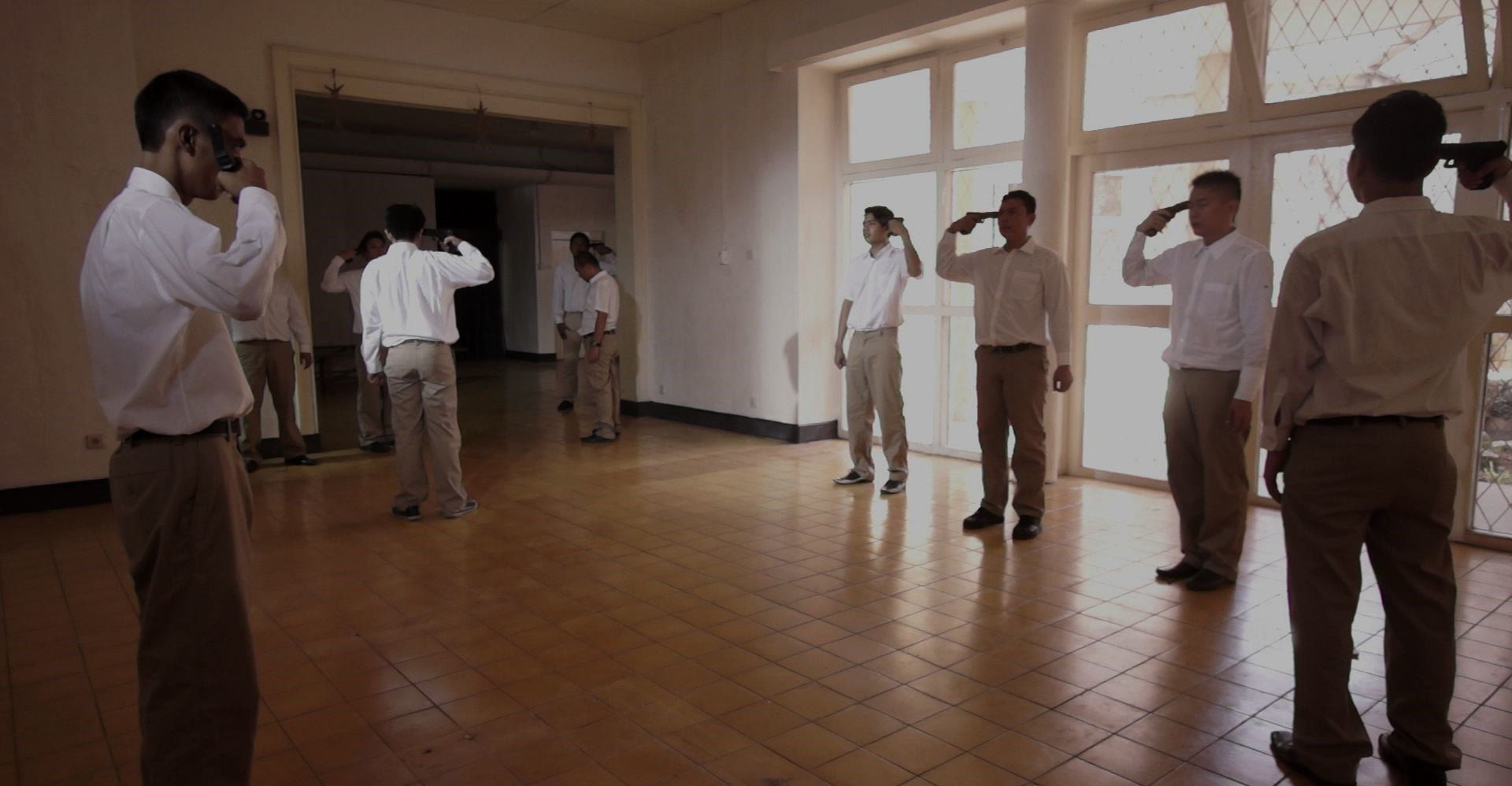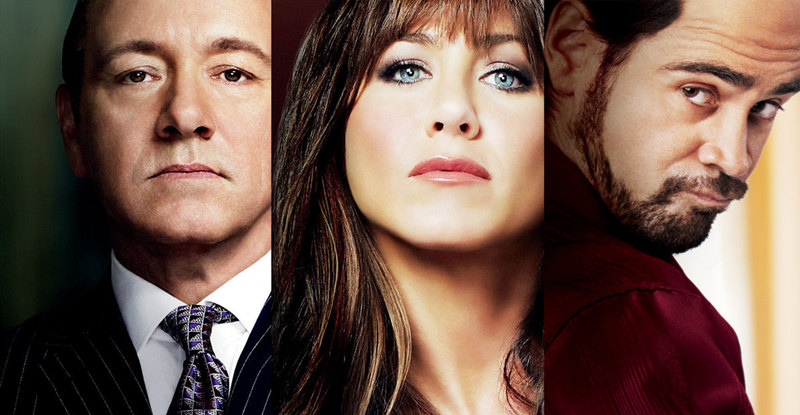The Farrelly brothers, Peter and Bobby, started out strong with “Dumb & Dumber” in 1995, continued on a mildly humorous track with “Kingpin” in 1996, and hit a home run with “There’s Something About Mary” in 1998. Then something not so funny happened. Their comedies weren’t so funny anymore. Think of “Osmosis Jones,” “Shallow Hal,” or their execrable remake of “The Heartbreak Kid.” With 2011’s “Hall Pass,” their old brand of outrageous whimsy no longer seemed to pack much punch, the movie looking and sounding more like a raunchy, worn-out television sitcom than a Farrelly product.
In this one, Mr. Nice Guy himself, Owen Wilson, stars as Rick Mills, a good, upstanding family man, a Realtor with a beautiful wife and three young children. Life is good. Except that after some years of marriage, he’s feeling the itch. The itch to be free, to date other women. At least, that’s the feeling he has, not that he has ever acted upon that urge. Instead, he does what most guys do: He fantasizes and jokes with his buddies about sex and other women. Of course, this is a comedy, and an R-rated one at that, so the Farrellys have to give us some exaggeration. Rick and his best friend Fred (Jason Suderkis), therefore, appear obsessed with sex whenever they’re together. That’s all they think about, all they talk about, every minute, as they ogle girls nonstop wherever they are. At least, it’s what they do when their wives aren’t looking.
When their wives (Jenna Fischer and Christina Applegate) do find out how preoccupied their husbands are with their sexual fantasies, they decide to give them the deal of their lives: a week off of marriage to cat around all they want, to get it out of their systems, so to speak. The wives give them a “hall pass.”
OK, that’s the premise and the set up, and you can easily guess what’s going to happen next, especially with the aforementioned Mr. Nice Guy Owen Wilson as the principal player. With their buddies in tow to watch, Rick and Fred plan to “reel in the babes,” as they say, but they’ve been out of circulation since college and have no idea how to pick up girls anymore. Nor do they know where to find women their own age (after all, they’re in their late thirties, early forties). Their idea of a pickup joint is the local Applebee’s, and the best alternatives they can think of when that doesn’t work out are the local Olive Garden and Chili’s. Yeah, they’ve been out of circulation a long time, and it doesn’t help that they’re acting like idiots. Meanwhile, as the guys are striking out, the wives, on their own, find more action than they do.
Basically, the plot and characters comprise the kind of sleazy material that begs for Charlie Sheen in the lead. Much of it is simply embarrassingly bad, the guys behaving in a ridiculously juvenile manner and the movie turning sentimental and corny at the end. It’s ironic that the Farrellys originally popularized this sort of sexy romp with “There’s Something About Mary,” and now it seems as though everyone does it better than they do, particularly since the advent of the Judd Apatow era.
Remember, as I said, Rick and Fred and their friends are in their late thirties, early forties, yet they still engage in poo jokes, masturbation jokes, body-parts jokes, pot jokes, and the like. It’s as though the Farrellys had never gotten out of college themselves. Or high school, the humor is so infantile.
“Hall Pass” makes one wonder if it isn’t an example of the dumbing down of America. Or is the movie a part of the cause of the dumbing down? Let me put it this way: The funniest character in “Hall Pass” is Richard Jenkins as an unlikely swinger, and the funniest parts of the action come during the closing credits. Even the deleted scene is funnier than anything in the film itself.
As a final nail in the coffin, the whole movie reminded me of a childishly updated version of Billy Wilder’s “The Seven Year Itch,” the old 1955 film that was sexier through innuendo and funnier all the way around. Of course, it had Marilyn Monroe in it, so maybe I’m making an unfair comparison.
Video:
New Line video engineers use a single-layer BD25 and MPEG-4/AVC encoding to transfer the film to Blu-ray in its original aspect ratio, 2.40:1. The results look compressed, the picture very bright, very glossy, and too often very warm and fuzzy. Definition varies, bouncing back and forth between reasonably sharp and fairly soft. Colors are rich, to be sure, but they frequently appear too intense, especially skin tones, which make almost everyone look deeply tanned or severely sunburned.
Audio:
There are times when it seems like using lossless sound is a waste of a good thing. This is one of those times, the DTS-HD Master Audio 5.1 hardly impressive. There is a decent stereo spread, the midrange is clean, and the backgrounds are quiet, which is about the size of it. Otherwise, the soundtrack is mostly just loud, with very little activity in the side or rear channels, a limited frequency response, and a restricted dynamic range. The music, taken from a variety of commercial pop recordings, puts only a touch of ambient bloom into the surrounds.
Extras:
Disc one of this two-disc, “Enlarged Edition” Blu-ray Combo package contains two high-definition versions of the movie, the theatrical cut (105 minutes) and an extended cut (111 minutes), with footage never seen in a theater. In addition, it includes two Blu-ray exclusives: an additional, four-minute scene that’s cuter than anything in the movie and a two-minute gag reel. The extras conclude with a mere eleven scene selections; promos at start-up; BD-Live access; English, French, and Spanish spoken languages on the theatrical version; English as the only spoken language on the extended cut; French and Spanish subtitles; and English captions for the hearing impaired.
Disc two contains a standard-definition version of the movie on DVD and an SD digital copy (the offer expiring June 12, 2012.) A cardboard slipcover encloses the flimsy Blu-ray Eco-case.
Parting Shots:
If the Farrelly brothers had made this film ten, fifteen years ago, it might have seemed a little more risqué or even original. Today, “Hall Pass” just seems old and tired, about as old and tired as its characters, trying their best to cut loose but unable to overcome their own middle-class limitations. Owen Wilson, as always, portrays a likeable guy, but “Saturday Night Live’s” Jason Sudeikis provides little support as his smarmy best friend. “Hall Pass” deserves a pass.
-
Video - 6/106/10
-
Audio - 6/106/10
-
Extras - 6/106/10
-
Film Value - 4/104/10


